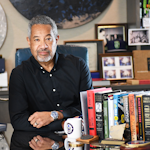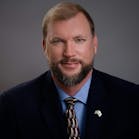Now that we are back to work, we face new and old challenges for the new year. Whether you have made resolutions, personal or professional, many of us look at a new year as a time when we can assess things from a fresh perspective. When it comes to business, I always loved observing the business landscape to see the potential opportunities and pitfalls that I and my team needed to be aware of. Here are three things you should think about as we begin a new year:
1. Strategic Goals - Take the time to look at your organization's strategic goals to make sure they are still valid. Issues change all the time, especially in business. Macroeconomics, consumer sentiment and market volatility all play a hand in affecting your organization's strategic plans. As a leader, you must take a realistic view of your organization’s goals and make sure they not only align with your company's goals, but with the reality of today's business climate. All you need do is glance at the daily headlines to know that the business climate is especially risky today. Be willing to course correct if it looks like your original strategy isn't working. There is no shame in this. The embarrassment would be to know that you need to alter course but were too stubborn to. As Colin Powell said, "Don't let your ego be so close to your position that then your position falls, your ego goes with it."
2. Productivity - Now is the time to be introspective about your work habits. Are you maximizing your ability to be as productive? Productivity is a direct reflection of your daily habits. Are you managing your calendars, meetings and emails in the most practical way possible? I have written separate blogs about productivity, so I won't go into detail on this. But I stress that you should look at the "how" as you approach your work. Do you tame the email and calendar, or does it tame you? Begin with prioritizing the most important tasks of the day.- Don't go back and forth between tasks.
- Stay focused on the projects that will get you and your organization the most bang for the buck every day.
- Don't go to meetings where you have nothing to contribute.
- Be meticulous about the meetings you are willing to attend and be willing to say no to requests that don't help drive your strategic goals.
- Set aside specific times in the day to read and respond to emails. Easy? No. Effective? Yes.
Look at your own productivity habits and just like strategic goals, course correct if it helps improve your productivity. Remember, the more productive a leader is, the more time they have to think strategically and generate important new ideas instead of constantly putting out fires.
3. Me Time - If you know me then you know this is something I talk about all the time. I’m a Type-A person who enjoys working with other Type-As. I suspect if you are reading this commentary, you are the same. Nothing wrong with that. Go for it. Balls to the wall as they say. But you must have "me time." Working damn near 24/7 is not a winning strategy.
As a leader, you need to know when it is time open the throttle full bore and when to throttle back and rest. In our technology-laden non-stop cycle of business and news, being sucked into scanning email on your mobile device at 3 am hoping for a competitive advantage is easy. However, not at the expense of needed sleep and rejuvenation. Leadership requires one to be sharp and productive every day, realizing that some days figure to be better than others. Even in the face of a crisis, you can control the outcome based on preparedness and clear thinking.
When I was at Microsoft, I placed my mobile in another room. If the balloon went up, my troops could call me on the landline. (Of course, now that I am retired, I have no landline). If you don't have a landline and can't put your mobile away, use discretion when responding. Assess the crisis and the risk.
The same approach goes with weekends. Constantly working on weekends is a non-starter. Work if you must but otherwise, look to yourself, your family, your friends and your pets. Work on your hobbies, have fun and decompress. Remember to work on yourself during the down times, and that the work will still be there on Monday.
So that's it. As we jump headlong into this new year, look to your strategic goals, your productivity and to yourself. Nail these three and you’ll be off to a great year. Great leaders take care of business and themselves.
He spent 22 years with the Central Intelligence Agency, finishing as a Chief of Station. Mike also worked in the CIA’s Office of Security and served on the security staff of the Director of Central Intelligence. He worked in the Counterterrorism Center, ran global programs, and served in assignments around the world. Mike’s first book, “The Art of Ronin Leadership,” is available now.







